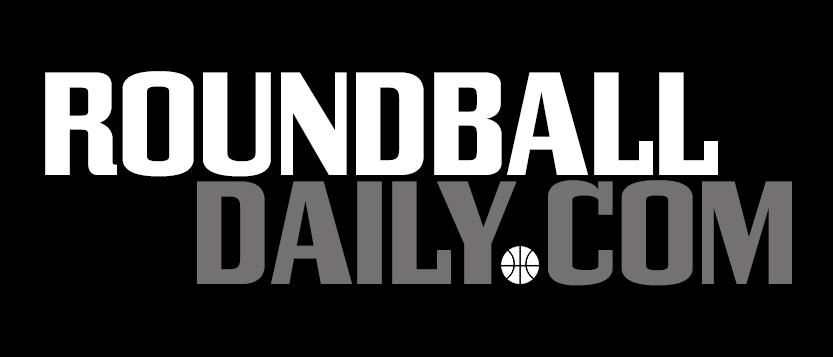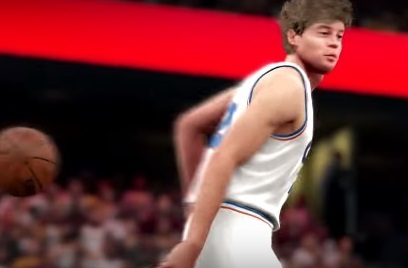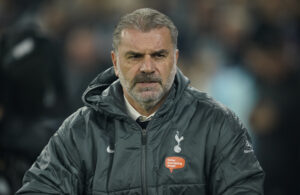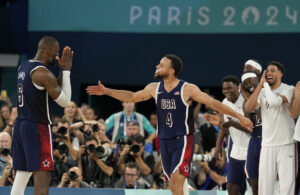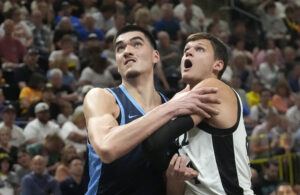- Attacking style not the only reason some Tottenham fans will back Ange Postecoglou until the bitter endPosted 6 months ago
- Paris Olympics takeaways: What did Team USA’s crunch-time lineup say about NBA’s hierarchy?Posted 12 months ago
- Zach Edey posted an easy double-double in Summer League debut. Here’s why he’ll succeed in NBAPosted 1 year ago
- What will we most remember these champion Boston Celtics for?Posted 1 year ago
- After long, seven-year road filled with excruciating losses, Celtics’ coast to NBA title felt ‘surreal’Posted 1 year ago
- South Florida men’s basketball is on an unbelievable heater– but also still on the bubblePosted 1 year ago
- Kobe Bufkin is balling out for Atlanta Hawks’ G League team. When will he be called up to NBA?Posted 2 years ago
- Former Knicks guards Immanuel Quickley, RJ Barrett may yet prove Raptors won the OG Anunoby tradePosted 2 years ago
- Rebounding savant Oscar Tshiebwe finally gets NBA chance he’s deserved for yearsPosted 2 years ago
- Is Tyrese Maxey vs. Tyrese Haliburton the next great NBA guard rivalry?Posted 2 years ago
Cavs legend, underrated star Mark Price now sharing his knowledge at Charlotte
- Updated: February 12, 2016
(RD)–Mark Price never looked like a basketball player.
He was six feet tall, 170 pounds soaking wet, with a history teacher’s haircut and the build of a male gymnast. In a league dominated by giants, the understated Oklahoman kind of looked like he wandered onto the court by accident. But like John Stockton and Steph Curry, Price proved that you don’t have to look the part to play the part in the league.
In 12 seasons in the NBA, Price averaged 15 points and 6 assists per game. In 1990-91 (maybe his best season) he averaged a double-double (17 points, 10 assists). He was a four-time All-Star, and a member of Dream Team 2, racking up over 10,000 points and nearly 5,000 assists, all while schooling unsuspecting stars like Allen Iverson.
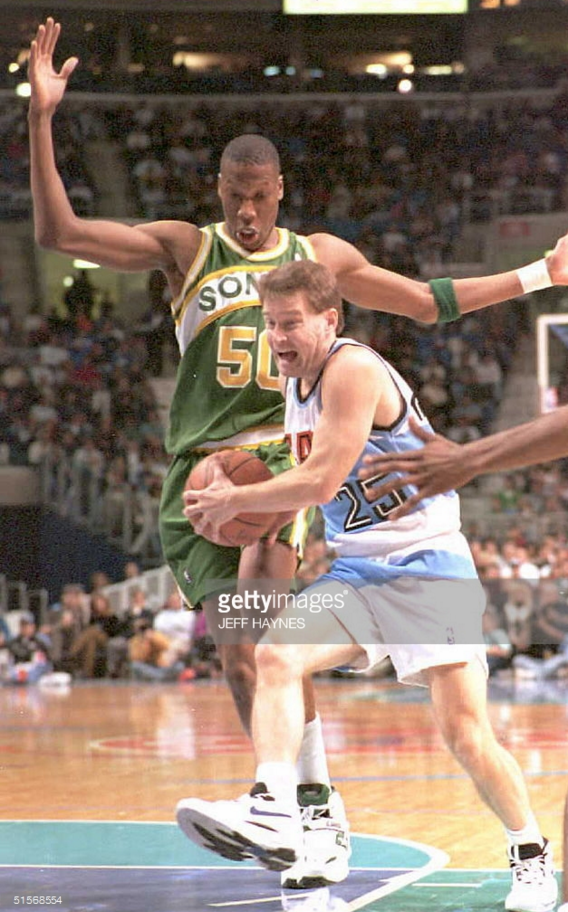
Mark Price may not have looked the part, but he was one of the most underrated players of the ’90s. (Getty Images Embed/Jeff Haynes)
Maybe the best way to illustrate Price’s brilliance is with the fact that he’s a member of the elite 50-40-90 club (50% field goal percentage, 40% three-pointers, 90% free throws), a group that includes exactly five other players: Larry Bird, Reggie Miller, Steve Nash, Dirk Nowitzki, and Kevin Durant.
So why isn’t Mark Price still a household name?
Well, maybe more than any player in the ’90s, Price’s legacy was trashed by Michael Jordan.
MJ’s Bulls beat the Cavs four times in the playoffs, including in the Eastern Conference Finals in 1992. You might also remember this shot, which sent the Cavs home in 1989.
We caught up with the 51-year-old, who after several years as an NBA assistant, took over as the head coach at UNC-Charlotte this fall.
Check it out:
RD: When did you know that you wanted to become a coach?
MARK PRICE: Well, after I got through playing and retired from basketball, I took a couple of years off. I had three small kids at the time, and I just kind of needed a break from basketball, to be honest.
It started with people wanting me to help teach their kids, or work with their guys, whether it be shooting or other things. And it just kind of seemed like I kept getting pulled back in to basketball. The more I began to teach and work with guys, the more I started getting the coaching bug, I guess you could say.
RD: Now, you had been an assistant in the NBA (with the Hornets) for a while. How did the opportunity with Charlotte come up?
PRICE: It was a little bit unexpected. It was kind of out of the blue. I wasn’t really pursuing anything in the college ranks. Charlotte approached me, and when I really looked into the situation, I got real excited for the opportunity. I was ready to be a head coach, and was just kind of waiting for the opportunity to come along, and when this popped up, it just seemed like a great fit.
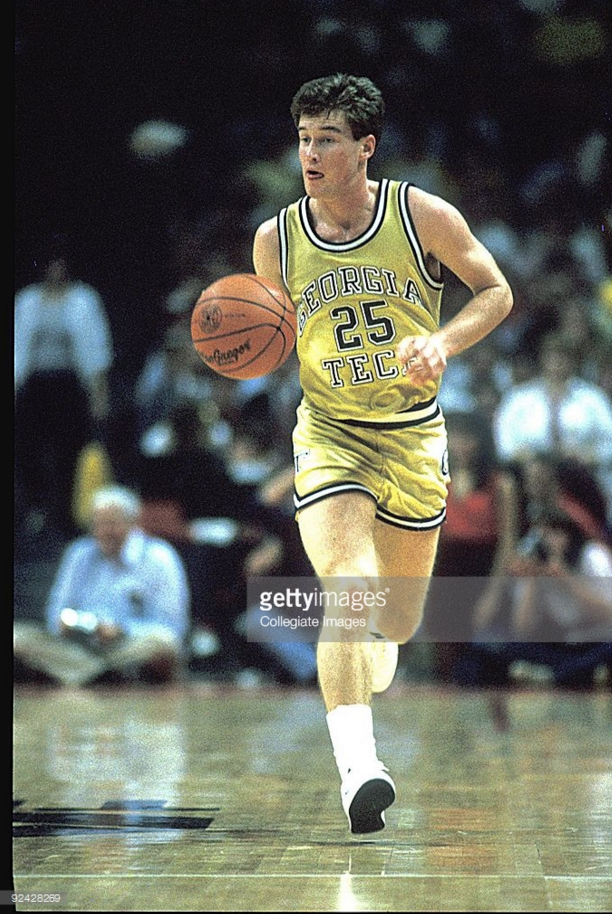
After being overlooked by bigger schools, Price led Georgia Tech to the ACC title in 1984. (Getty Images Embed)
RD: You played for Bobby Cremins, but you spent the last eight years coaching in the NBA. What do you think has most influenced your coaching style?
PRICE: I obviously learned a lot playing for coach Cremins. He had a great love for the game, great enthusiasm, when we were at Georgia Tech, building that program. And yet, the last eight years, I’ve been up at the NBA level. I would say my style of play is definitely more from the NBA game. But I was fortunate to play under a lot of great coaches over my career, my dad was a coach, so I probably take bits and pieces from everybody that I’ve worked with or played for, and kind of just developed my own style.
RD: This team got off to a rough start (1-8), but you’ve come around lately. You’ve won a lot of games recently (49ers have won four of six and are 8-15 overall). Do you think your players are finally grasping what you’re trying to teach?
PRICE: I think it was a combination of things early. We were all thrown into kind of a tough situation with so many guys having left the program by the time we got in. We really had to bring in eight new guys to the roster, and we only had one guy that had any previous college playing experience on our team.
So we’re extremely young, extremely inexperienced. Any time you bring in that many guys, trying to learn not only in a new system and new coaching staff, but learning each other. Basketball is a big chemistry sport, and when you have that many new players, it takes a while.
On top of that, our early schedule was brutal, going to the Bahamas tournament (Battle 4 Atlantis) and then having to come back and play schools like Davidson and Miami (FL). It was a tough fire to get thrown into for our guys. But to their credit, they’ve kept working hard, they keep listening, they’re learning, and I think everybody now is starting to feel comfortable with what we’re doing on the floor. Our goal from day one was to try and get better every day, and we’ve definitely seen that progress.
RD: Looking at UAB, seeing what they did in Conference USA, last year, do you think your team can make a similar kind of run?
PRICE: Well, I think that’s the goal of every team in our league. I’m sure everybody looks at UAB and what they did last year. Everybody is trying to play their best basketball heading down the stretch of the season, going into the tournament, because at least so far, our league has been a one-bid league. It comes down to the conference tournament winner. So if you can get hot, playing your best basketball, you feel like you’ve got an opportunity going into the tournament.
RD: Now, this generation is a little bit removed from when you played. I’m wondering if your name, when it first comes up to these recruits, if they know who you are?
PRICE: Well I think a lot of the kids probably don’t, to be honest, but most of their parents do. And the beauty of social media, YouTube and everything else, they can pull up and see me an what I did as a player. They can find out a lot of information about me quickly.
But a lot of the guys I was able to get in front of, it comes from the fact that their parents saw me play, know my history, and they want their kids to come play for me.
RD: I feel like you’re one of the more underrated players of your generation. Do you feel like you get the credit for the kind of career you had?
PRICE: I think probably the general public don’t, but I think basketball people, they all know how good I was. And I get the respect from the players and coaches that went up against me. I never really got caught up in that.
I played in a market in Cleveland at the time that didn’t get as much publicity as if I’d have played in a New York or a Boston or an L.A. or somewhere like that, but that was OK with me.
I loved playing for Cleveland, and for my teammates there. We had really good teams, and I don’t get too caught up in whether I get recognized for this or that, I think real basketball people know how good I was, and what I was able to accomplish.
RD: Have you ever YouTube’d yourself in front of your players and showed them how good you were, to try and get them to listen a little bit more?
PRICE: They’ve all picked it up and looked at it themselves (laughing). I’m sure when they hear about it, the curiosity gets to them. But when they talk to me, they know me by playing in a video game. I guess I’m still in some of the video games they play now, so that’s kind of funny.
RD: Are you good in the video game? Do they come back and say, coach, you’re kind of nasty?
PRICE: Well…I make all my three-pointers, they say. (Laughs) They’re telling me I light it up from 3, so I guess they got me as a three-point shooter in those games, I guess.
RD: Speaking of threes, I was just wondering about your opinion on Steph Curry, and the way he’s playing right now. Back when you played, there were a lot of great three-point shooters, but he’s kind of taken it to the next level. Do you think he’s changed the way the game is played?
PRICE: Well, he’s playing at an incredibly high level right now. It’s really been amazing the last year and a half how well he’s shot the ball, and like you said, become a primary scorer at the point guard position, and that’s definitely changed.
There were a lot of good three-point shooters when I played, but the emphasis was more on dominant big men. It seemed like there were a lot more really dominant big guys like Olajuwon, and Ewing, and Dougherty who I played with. It seemed like every team had a dominant big guy, so a lot of teams played more inside-out.
Now it seems like there’s fewer quality low-post big guys, and the game has turned into teams shooting 35, 40 three-pointers every game, and that would have been..teams would never have thought about shooting that many 3’s back when I played.
RD: Are you leaning that way in terms of your philosophy, shooting more 3’s?
PRICE: I think the style I ultimately want to play–and I’m having to play that way now kind of by happenstance, because we’re undersized. I’m playing four small guys and one big guy, and spacing the floor, spreading it out.
The three-point shot is a big part. At least in our conference right now, I think we’re in the top one or two teams in three-pointers made per game. So, it’s definitely a style that I’m leaning towards. I think it’s a style that a lot of kids want to play now.
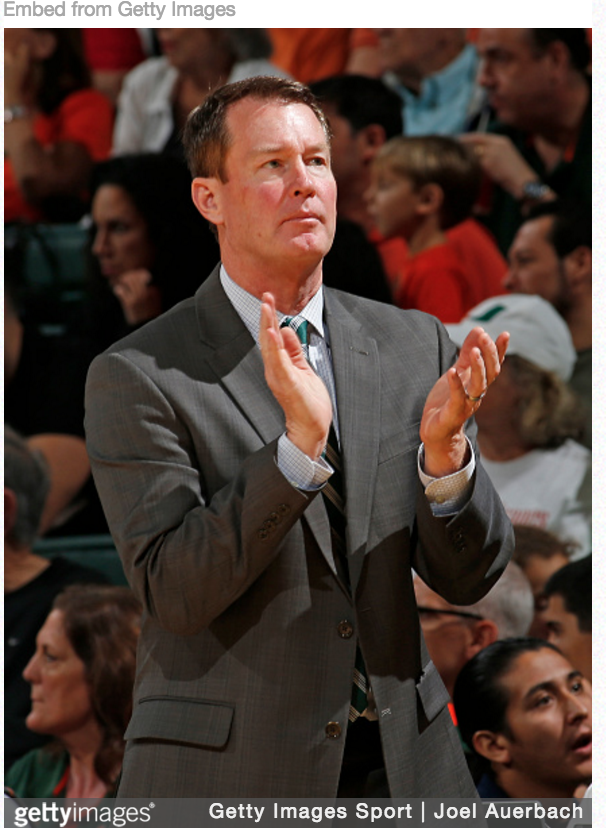 RD: Do you think it’s a style that plays right into your hands as a coach?
RD: Do you think it’s a style that plays right into your hands as a coach?
PRICE: I do. I do. How much of an advantage [it is], I don’t know. But, I know most kids that come in front of you, every kid now wants an opportunity to play professionally. The guys that are really good players, and maybe it’s their shot that is keeping them from getting them where they want to get to.
That’s obviously something that I can help them with, and maybe another coach at another school might not have that expertise. I definitely try to use that, when we recruit guys, and my background is in player development. I think that’s helpful as well. I know how to help guys get better, and obviously that’s my goal when young guys come play for me here at Charlotte. I want them to leave a lot better than when they got here. That’s something that’s a big goal of mine, and I want it to be a staple of my program.
RD: You guys obviously had a great rivalry with the Bulls. Was there ever a moment there where you thought, this is it. We’re going to beat these guys?
PRICE: Yeah, I mean everybody remembers the infamous shot over Craig Ehlo in the playoffs. I mean, we thought we had that series won. We were down 1 with about six seconds to go, and we scored to go up, and there were 3 seconds left.
So, we thought we had that one, and then obviously Michael hit the shot. We had a really good team, and those were great series. It just seemed like Michael was able to take it to another level every time we tried.
RD: Do you think if it wasn’t for Michael, you guys would have been a championship-caliber team?
PRICE: Oh, no question. No question. We were definitely in the mix, we felt like we were good enough to win one. And we weren’t the only team that had a hard time getting by Michael and the Bulls (laughs). You know, they knocked a lot of teams out. But it was still a great ride there in Cleveland, we had some really good teams. I always loved the challenge of playing the Bulls, and getting in the playoffs. It was a great time for us there.
RD: Now, when you think of a basketball player, you may not be the prototypical guy that you think of. How much of an obstacle was that, especially in getting to the NBA?
PRICE: It was definitely an obstacle. I certainly didn’t look the part (laughs). I was 155 pounds coming out of high school, and I had a lot of what you call big-time basketball schools pass me by because they thought I was too small. Georgia Tech took a chance on me, and it worked out pretty well for them. But you know, I never let all that stuff bother me. I just knew what I could do, I knew what goals I had, and I worked extremely hard to develop my skill level, and my game, to be able to play against the best guys.
I got to do it in college in the ACC, I mean the ACC was off the charts back then. I think about every point guard I played against in college ended up in the league. So you know, it was really, really challenging every night, and to get to compete at that high level, it was just something that I relished, and I really felt like I was as good or better than everybody I played against. That was just kind of my mindset, that I think allowed me to be successful.
RD: Do you think you can translate that to some of these kids you’re coaching now, because you’re not at the highest level of D-1 in terms of recruiting.
PRICE: Yeah, no question. No question. It’s a great fit from that standpoint. There will be a lot of kids that come through our program that were overlooked by a lot of people. We’ve had four times already we’ve had freshman of the week winners, and guys continue to grow and get better, and people are like, man, where’d you find all these guys? So you know, I like that. I like guys that are hungry, guys who want to come in and show people that hey, they were wrong that passed on them, and use that as motivation to help our team.
RD: Now, maybe the biggest difference between the NBA and college is recruiting. I was wondering, how tough is it to recruit for you, and how much time does it take up on a given day?
PRICE: Well, it’s definitely a big part of the college game, no doubt about it, and I think you have to have really good people around you. I’m fortunate, I have a lot of guys around me who have coached at a college level who were really helpful to me when I was putting my staff together.
My assistants right now, I let them know that’s kind of the number one thing. I want them out there finding players. Finding the right kind of guys for our program. And that’s a non-stop thing, you know, even though we’re almost set for next year, we’re already recruiting for ’17 and ’18, and you know, you just gotta keep it going. It’s like a snowball that never stops. It is a lot of work, and you’ve got to find the right guys who enjoy getting out there, who have connections, to find the right kind of players for your program.
RD: What’s the biggest challenge, maybe unexpected that you guys have faced this year in your first year as a coach?
PRICE: I think the biggest challenge, any time you come into a new situation, obviously when you get hired, something was going on in the program before you that they wanted to change. And so, I think the biggest challenge always is developing your culture. I feel like we’ve done a really good job of that here.
I think, the first year here, obviously you want to win games, but ultimately the wins and losses to me aren’t the most important thing. When you’re coming in, the most important thing is establishing the kind of culture that you want to build. And when you get that settled, I think it hopefully makes things down the road a lot easier.
